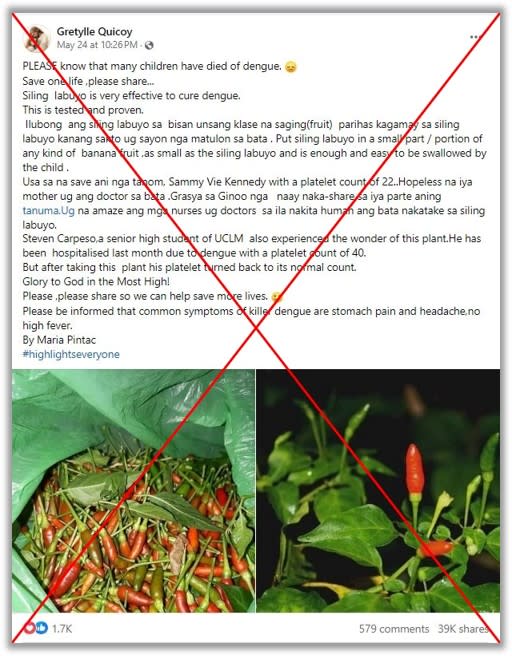Doctors dismiss Facebook posts touting popular Philippine chilli as 'dengue cure'
Doctors in the Philippines have refuted social media posts shared tens of thousands of times that falsely claimed consuming "labuyo" -- a popular chilli in the archipelago -- can cure dengue. They said treatment for the mosquito-borne disease is focused on managing symptoms but hospitalisation is needed for severe cases.
"Labuyo chilli is very effective to cure dengue. This is tested and proven," read part of a Facebook post, written in a mix of English, Tagalog and Visayan, shared on May 24, 2024.
The post, which was shared more than 39,000 times, said the blood platelet levels of dengue patients had "returned to normal levels" after consuming the extremely pungent chilli, which is a staple in Philippine cuisine.
The World Health Organization (WHO) says most people with dengue have mild or no symptoms and get better in a week or two, but in severe cases the virus can cause abdominal pain, bleeding and even lead to death (archived link).

Near identical claims have been circulating on Facebook since at least 2017 here, here and here.
It resurfaced at the onset of the Philippines' rainy season, when dengue cases are more prevalent (archived link).
Data from the country's Department of Health (DOH) showed 59,267 dengue cases were recorded between January 1 to May 4. According to the SunStar and The Philippine Star newspapers, 45,722 cases were reported for the same period in 2023 (archived links here and here).
While AFP cannot independently verify whether patients who consumed the chilli saw their blood platelet levels return to normal, as claimed in the posts, multiple doctors said the chilli has not been proven to cure the viral infection.
'May actually be harmful'
Infectious diseases expert Dr Rontgene Solante, from Manila's San Lazaro Hospital, told AFP on June 3 there is no current scientific evidence that eating the chilli can either "increase platelet count or has a role in the treatment of dengue".
"In patients with dengue, the low platelet count is part of the course of infection as a result of virus in the blood. It will spontaneously normalise on the 7th to 10th day of illness or during the recovery period," he added.
Infectious diseases specialist Dr Marion Kwek from the Makati Medical Center, a major hospital in the Philippines, also said the chilli is "not used as a cure for dengue infection".
"Usually for dengue we make sure the patient is hydrated enough and platelets go up on their own eventually."
"If anything, chilli is a gastric irritant and since gastritis often occurs in dengue, giving chilli peppers may actually be harmful and aggravate gastrointestinal symptoms," she told AFP on June 4.
The Philippine Institute of Traditional and Alternative Health Care also said "there is no published research" indicating the chilli can cure dengue.
"It is still highly recommended to consult a certified physician regarding the right treatment or management of dengue," the agency told AFP on June 10.
There is no specific treatment for dengue though pain can be treated at home with paracetamol, according to the WHO.
"For people with severe dengue, hospitalisation is often needed," the agency added.
AFP has previously debunked posts touting unproven remedies for dengue here, here and here.

